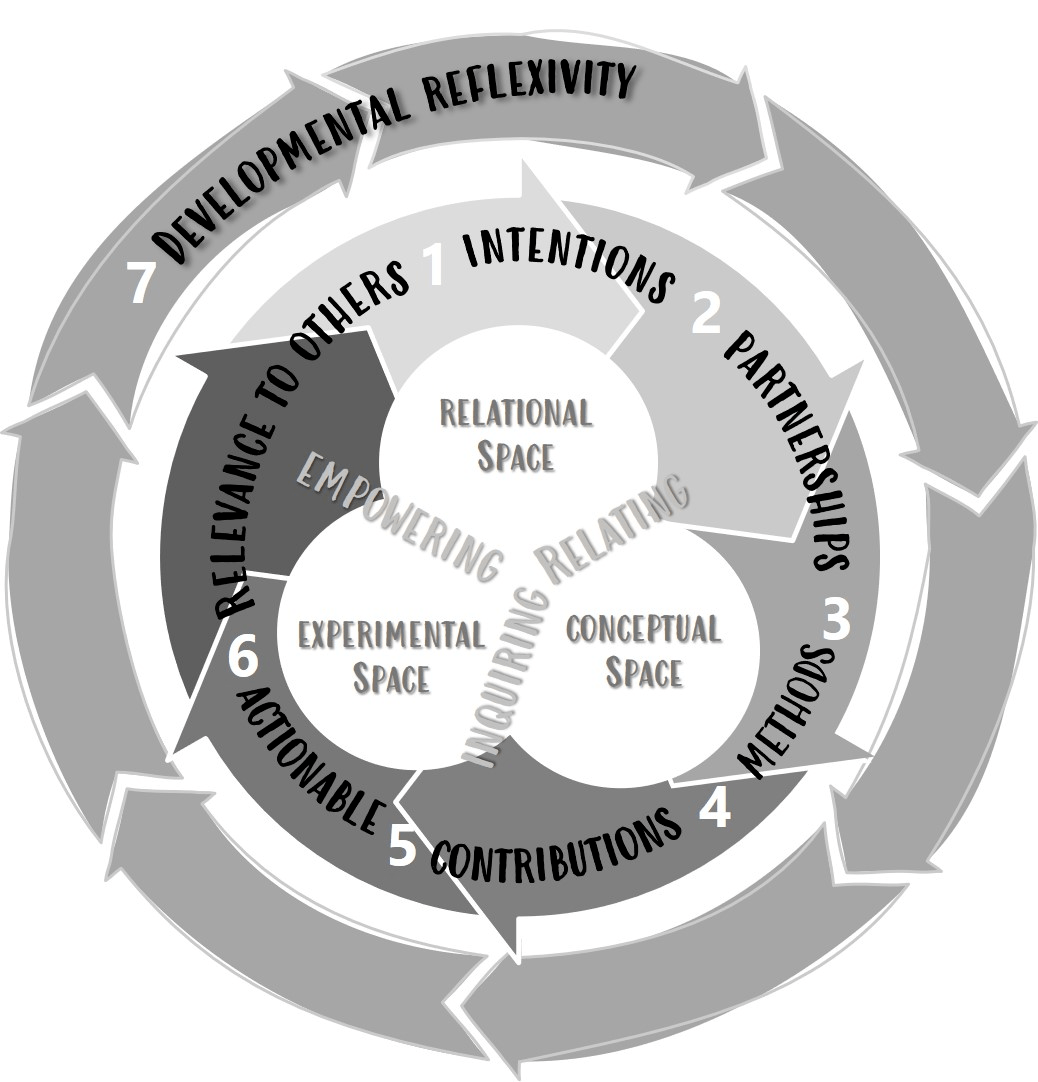Your first practice at home
We’re delving into the first key space for learning, namely relational space. We do this by including attention both to the external space, with your stakeholders, and as an internal space, with yourself. You are therefore practicing how to manage/ facilitate others attention, AND your own!
- Take a copy - of the Protainer Guidelines. These were developed at AR+ as a support for our work together in helping transformations happen.
- Print out the ART metamodel cycle. We will use this model for the next modules.
Protainer Guidelines
The relational ART protainer
The key ingredient - in the sauce of the protainer - is working toward a space of mutually transforming power. In some ways that may be as simple – and as profound – as being interested in the other for the sake of the other.
Speaking from the heart and honoring silence we might call generative lies at the heart of the matter.
Putting this up front and center means different things, from caring to make sure to reduce noise (physical and mental), the experience of more alertness invites what’s appropriate in the space. Pausing – briefly as a regular practice – means we are choiceful about simply continuing momentum from a previous conversation. When in doubt just stand there! (Around AR+ we also encourage standing and movement). At the heart of the matter, we all want any gathering to feel like a great use of time; we want, and need, to feel that we’re in a safe – not necessarily always comfortable – space. After a while you will come to be intolerant of what passes for the horrible meetings in which there is machine-like attention to getting through an agenda.
The more evolutionarily minded among us may consider that it doesn’t come naturally to humans to have authentic conversations with people outside our blood tribe, much less when using electronic media. Perhaps that’s because we evolved as a species on the savannah where we spoke face to face with people we’d known since birth.
In other words, our working with new people (moreover electronically) is an ongoing challenge given our evolutionary origins, albeit with signposts from our learning to enter into relations of exchange (e.g., trade) over many centuries. All sorts of issues of trust and discomfort can naturally arise. But the upside is huge: the exciting possibilities of developing new friends, new types of chosen tribe, and co-creating sustainable economies/societies across continents and timezones.
A big part of ART is to dare to turn our anxiety into learning. The following guidelines offer a structure attempting to balance the gifts of extraverts and introverts alike.

Protainer Guidelines: Enablers of Shared Attention
Invite participants to arrive a bit early and chat before starting more formally. Best is to start all meetings, however informal, with a brief 1-2 minute settling in, in silence or with centering (dance? Instrumental?) music. This allows busy people to arrive in body alongside their attention. This can be followed by a reminder of the advance agenda. Then choose either a check-in, and or brief rollcall.
Check-in and/or Rollcall: Action Research progenitor Kurt Lewin invented the check-in so that all voices in a space could be part of shaping the conversational space from the start. A minimal version of this is the rollcall in which people briefly share their name, location, inner and outer weather (the latter a favorite at AR+). This calls people’s attention to themselves and one another, and can be used to entertain agenda change suggestions.
Check-in involves a round of sharing relevant experience that people bring to the call, without cross talk or interruption. It’s important not to confuse check-in with the more simple rollcall. Check in is typically more expansive. A check-in may be most appropriate when a group is first getting to know one another and then practice occasionally in the life of a steady group.
A happy medium may be to break into smaller groups for check-ins such as in dyads and triads, after a full group rollcall. In a group of 100 or larger, polling techniques just to see who is in the room may have to take the place of a rollcall and then smaller group checks in will help create relational space.
The following reminders can be helpful for setting expectations, especially for a new group.
Agreements:
Interpersonal savvy | Technical savvy |
Share the conversation space and follow the facilitation (if there is any). | Look like you are present. |
Return – as often as useful - to shared intention; keeping ‘good, true and beautiful’ in mind. | Use the power of gesture (thumbs up etc) for simple communication. |
Share from the heart, with brevity (no lectures). | Nurture a relaxed space. Noise cancellation tech helps. |
Listen generously – catch your own reactivity. | Sit in a well lit space. We want to see one another. |
Keep the space clear – constructive feedback is always useful and may be necessary afterwards too. | Stay connected to your body’s wisdom. Turn off your camera to move and stretch as needed. |

